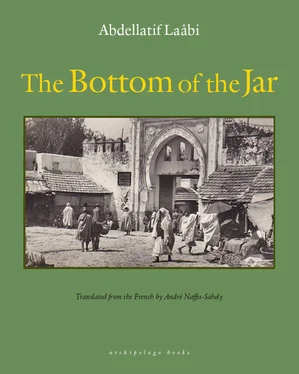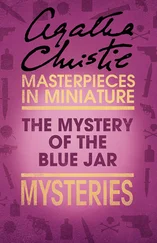A good thing no one ever saw me or heard the rosary of my ramblings click its beads inside my head. Because of the nature of the time we were living in, I would have been accused of being indifferent to the suffering that was being inflicted on us and labeled a defeatist. Ideas needed to be clear, practical, and put to the service of a decisive battle. That said, I had no idea the sky was about to deliver a wholly different message.
It was toward the end of July and there was a full moon on the rise. It had been a year since the king of the country had been forced to abdicate the throne and sent into exile. He was now living under house arrest in a distant African island that Driss insisted on calling Madame Cascar. Alongside everyone else in the family who was educated, I was amused by this eccentric way of pronouncing it. We had long since located the big island on the map of the dark continent and started to study it. We were less interested in Antananarivo, the capital, than we were in the more modestly sized city of Antsiranana, where Ben Youssef had been banished. There were numerous parallels between the histories of our countries. Both were protectorates. Once upon a time, the queen of the empire had also been made to abdicate and sent into exile. It was clear that our colonial masters didn’t like monarchs. It’s to be expected, one of the more erudite among us said, it’s been quite a while since they cut off their own king’s head.
“Who rules them then?”
“A leader that they choose every seven years. At which point it’s someone else’s turn.”
“Who picks him?”
“Everyone, men and women.”
“Even porters?”
“If they lived over there even Aâssala, Mikou, or Chiki Laqraâ would be able to choose.”
“And what do the ulama 18think about that?”
“The ulama in France don’t concern themselves with these matters.”
“Who concerns himself with these matters then?”
“People like Belhassan Ouazzani.”
“Does he agree with the people who cut the kings’ heads off?”
“Not at all. He and the sultan go hand in hand.”
“What about Allal?”
“Him too. Even more so.”
“More than what?”
“You’re making my head ache with all your questions. Wait until you’ve grown up, then you’ll understand.”
It can’t be said that I didn’t make an effort.
BEN YOUSSEF HAD come back!
The rumor swept over our city like a gigantic wave rising from a raging inner sea. Since we weren’t experienced mariners, we were dragged to its depths and swept away by the current. We didn’t know what to clutch on to in order to welcome the good tidings without losing our minds. From the four corners of the city, clusters of human beings in every house formed chains to buffer the shock and begin to react. When we had finally recovered the ability to speak, all we could do was stutter our way through questions like excited birds: What, what, what? When? Where? With whom? How? By sea or by air? By a car or on horseback? Is it really him or is it a clone? Has he given a speech? Has anyone seen him with their own eyes or heard him with their own ears? What is the radio saying? Where can we find out more?
The wave continued to sweep over us and little by little Fez transformed into a sort of Noah’s ark. Belief won out and soothed our hearts. Having remained blue throughout the storm, the sky comes to mind as a happy memory. It saw to it that the sun offered us a glorious sunset. Its face blushed a deep crimson, with gentle fire. When the muezzins sang their call to prayer, their voices had such a sweet languor it was as if the words had transformed. All of a sudden, the swell receded. We continued floating in our ark, rocked by the lyrical call to prayer and the graceful light.
Did we dine that evening? There’s no way to be sure. We needed to talk, to pay visits to one another, to touch one another, to add to one another’s happiness, and to plan, to plan for our future with our pens and our ink, our own colors.
We rediscovered our hands, hands that had never stopped painting, writing, drawing, sculpting, engraving, illustrating, weaving, braiding, embroidering, hammering, sewing, gluing, paving, grinding, plastering, distilling, molding clay, iron, silver, leather, bronze, feeding children, the poor, orphans, guests, and God’s madmen. Our hands that we had doubted and that were now opening up, palms to the sky, so that it could bless them and bestow its manna upon them.
Upon that, night fell. We felt happiness glow within to the point that we didn’t need to switch on many lights. That was when we heard the first ululations. Others rose up in reply, then the trilling intensified, amplifying to the point that the walls began to tremble. Ghita gave vent to her frustration and joined the fray. My sister Zhor immediately replied in kind. At that moment, someone knocked on our door and gave this astonishing piece of news: Ben Youssef appeared on the moon!
“Let’s go up to the terrace!” Driss yelled.
We rushed up the stairs. The farther we climbed, the more the concert tore at our hearts. Once in the open air, we bumped into our first-floor neighbors. In the rush, none of the women had slipped into their djellabas or covered their faces. They were in house clothes. The men didn’t notice anything amiss. They were distracted, their necks craned toward the sky. The neighboring terraces were also crowded with people. It seemed like all of the city’s inhabitants were gathered on the rooftops to observe the phenomenon. Wave after wave of ululations rose, punctuated by invocations that had some trouble finding their tempo at first, before melting into a single mold and agreeing on a common slogan:
Moulana ya doul-jalal
Ben Youssef wa-l-istiqlal!
Oh Lord of glory
Ben Youssef and independence!
As this was happening around me, the moon-gazing produced several wholly different interpretations. Ghita, whose sight was deteriorating, asked whether the sultan was standing up or on horseback.
“What horse?” Driss scoffed. “Open your eyes, you can only see his face.”
“Don’t tell me you’re going to teach me how to look? I tell you there’s a horse up there. I’m absolutely certain of it.”
“Return to God woman. It’s just the shadow of his djellaba’s hood. Can’t you see the sultan’s eyes, his nose?”
“What about his mouth, where is that then?”
“Where do you think it is? On his forehead?”
Employing her renowned gift for pedagogy, Zhor cut in and pointed at the moon.
“Let me show you, dear Mother. The face is right in the middle. Follow my finger.”
“Where is your finger? Think I’ve got cat’s eyes?”
“Here it is, hold on to it, and follow me as I show you. There, that’s the outline of the djellaba’s hood. There’s his round face, and here are his lips.”
“Ah yes, dear, it seems you’re right. Now I can see his mouth, and it’s as if it were getting ready to talk.”
While everyone was reaching a consensus, I tried my best to determine what I was looking at. Alas, even though I really applied myself — the moon as my witness — the results were hardly conclusive. It was certainly shining more than usual and some unrecognizable shapes could be glimpsed. Yet I could see nothing resembling a clearly defined face, regardless of whether it looked anything like the sultan’s. In any case, the portrait of his that I was familiar with — which my father had destroyed in his moment of panic — depicted him in profile, with a watani on his head, and everyone around me was speaking of a head rather than a face, and that it was covered with a hood. That said, how could I possibly doubt, even for a single moment, the reality of what everyone unanimously agreed they could see, a vision that was becoming increasingly detailed, and which they were waving at with great joy and devotion? I could only put my inability to see the sultan down to poor eyesight and other infirmities connected to my age. Adults had faculties that I clearly lacked. The simplest option was to blindly believe them. From there I’d be only a step away from a true leap of faith, and wanting to dispel my doubts, I took the plunge. I surprised myself by poking fun at Ghita, who was guilty of having dragged her feet before accepting the official interpretation.
Читать дальше












